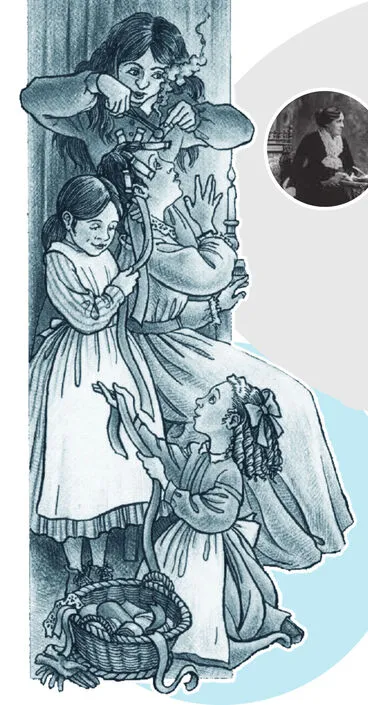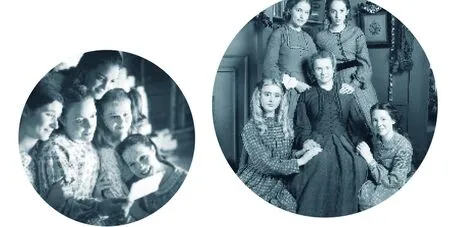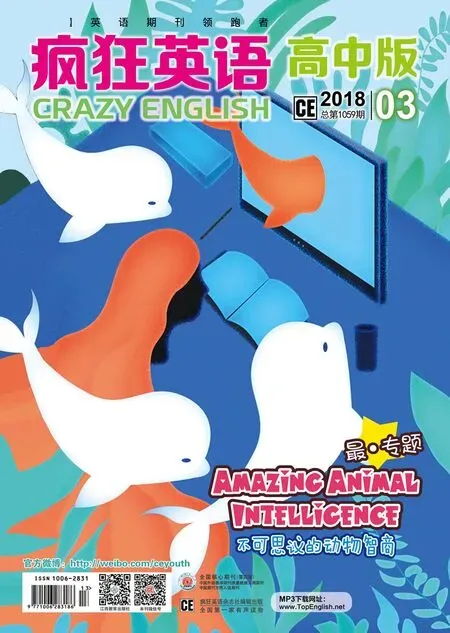BRIDGET ARSENAULT:YOU JUST NEVER KNOW
2018-03-07ByEmilyChiswell
⊙By Emily Chiswell
翻译:BillyBudd

听力难度英美发音 适合泛听语速:170词/分钟
布里奇特·阿瑟诺可谓“有两把刷子”。起初,布里奇特一直都想做一名新闻记者,就在知名杂志《名利场》(Vanity Fair)工作了八年;期间,她还成立了“光明青年电影俱乐部”(The Bright Young Things Film Club),以展示那些年轻的、未来的电影制作者及其作品;近来,她又担任了慈善机构“解放儿童组织”(Free the Children)的副主任一职。这位女士忙活的事情可真不少!这一切只因为,开始做某种你所喜爱的工作并不意味着你接下来的人生就此定格了。未来,从来都不是一个定数。
Interviewer:So Bridget, tell me, what’s a journalist, film club founder?
Bridget:Uh, I think journalist and businesswoman is a great start, and I’m also currently the Deputy Director of Free the Children UK, which is a Canadian charity that has a UK office, and that is a new move. I’m just rounding up week three…
Interviewer:So, super new.
Bridget: …so, very, very new, after…I mean I’ve been a working journalist since I was 16,if you wanna count high school newspaper,local paper. I mean, I’m a writer, I’m a, you know, a creative person and a writer.
My job at Vanity Fair was editing, it was events, it was admin, and my real1)passionwas the writing side. So, I had done that for eight years. I loved working at Vanity Fair,and I came into work every day so proud.So, I think having that time working there—I never took it for granted—it was definitely the dream, but I also learned the dream was writing for a2)publicationlike that, and I think it was time to try something new…Free the Children is a Canadian charity that I had been involved with as a youth member, so…
Interviewer:Wow, so a long connection.
Bridget:I have been a volunteer at Free the Children since 1998, and that I definitely approached from, like, a business angle, from an events angle, but also I got into film as a writer, you know, after watching films and watching plays and thinking, “Oh, my gosh,how did that writer do that?” You know, they take a concept and put it onto the page and then put it onto the screen.
And I go to the theatre a lot, and I love watching audiences and being like, “This is when they’re bored, this is when it’s really working,” that, and I really try to approach theatre and film as a writer, so I was quite passionate about film.
1) passion [΄pæʃn] n. 激情,酷爱,下文的passionate是形容词。
2) publication [ˌpʌblɪ΄keɪʃn] n. 出版,出版物
3) agency [΄eɪdʒənsɪ] n. 代理,代理机构

I like having3)agency,I like coming up with an idea and then being like, “Should we do it?” So I run the film club with one other girl, Fatima Martinez. And I think having that agency is a really powerful and important thing. And so, I think this job at Free the Children is a progression of that…
Interviewer:Absolutely!
Bridget:…and learning that I like, trying to,you know, make decisions, trying to action things, trying to help people be better at things.
Interviewer:Uhm, Bridget, tell me advice.What advice do you wish you’d been given,that would have been handy, perhaps, for you when you started all this off?
Bridget:Sometimes, I need to take a deep breath and not be so focused on what I wanted to do. There’re a lot of different jobs out there, and you never ever know what’s gonna be the one that4)sticksfor you, and one might stick with you for five years, and then you realize that your strengths take you in another direction. So, for me, I learned that I prefer the writing side than the editing side.
Sometimes you think you’re gonna love something, and it doesn’t play to your skills in the way that you want it to, and that’s OK. I think it’s great to acknowledge when something doesn’t work, and I’m always a big fan of learning from what doesn’t work, and I definitely went with someone in college who knew the three schools that I wanted to go to for graduate school. And when I was in high school, knew the three companies that I wanted to work for, and I wish someone had told me to take a deep breath and, if I didn’t go to one of those colleges, it was still going to be OK.
And I think, if you put yourself out there and if you try anything, you’re going to fail or it’s not gonna work out in the way you thought it was going to, that it’s just a learning experience. You just never know.I think that’s one thing that I really had the pleasure of learning over the past 10 years.
见招拆招
作文素材常积累:布里奇特·阿瑟诺——There’s a lot of ways into what we want to do now, and also there’s a lot more things to do. 布里奇特出生于加拿大的一个小镇,在学生时代,她对文体家(具有独特风格,自成流派的作家)一无所知,更不知道自己将来会热衷于写作。时代在进步,人所面临的机遇和挑战也在增多,问题在于我们如何去把握机遇、应对未知的挑战。布里奇特用她的经历向我们证明,一个人的未来有多种可能。
词组:round up
动词词组round up有多种意思,比较常见的是“使聚拢;围捕”;此外,它还可以表示“舍入,(将数字调高)使成为整数”,如:
● He rounded up a few friends to help him. (他召集了一些朋友来帮他的忙。)
● The police rounded up a number of suspects. (警方围捕了好几个嫌疑犯。)
● The refund of $19.5 has been rounded up to $20. (退款已由19.5美元调为20美元整。)

4) stick [stɪk] v. 卡住,固定不动
采访者:好了,布里奇特,告诉我,记者跟电影俱乐部创始人的生活是怎样的?
布里奇特:呃,我认为记者和女商人是一个很好的开始,我现在还是英国解放儿童组织的副主任,这是一个加拿大的慈善机构,在英国有一个办事处。这是我的新工作,我才加入不到三个星期……
采访者:哇,超级新人。
布里奇特:……对,非常、非常新,在那之前……我是说,我从16岁起就开始当记者了——如果算上高中校报跟地方报纸的话。我的意思是,我是一个撰稿人,我是一个,你瞧,一个创意工作者兼撰稿人。
我在《名利场》做的是编辑工作,我的工作与活动项目和行政管理有关,而我真正热衷的是写作。所以,我一做就是8年。我喜欢在《名利场》工作,我每天上班的时候都觉得非常自豪。所以,我认为在那儿工作的经历——我从来没有觉得那是理所当然——那曾是我梦寐以求的事,我明白我的梦想是为这样的出版物写稿,但我也认为是时候尝试新东西了……我在青少年时期就参与过解放儿童这个加拿大慈善机构组织的活动,所以……
采访者:哇,这么久的关系了。布里奇特:我从1998年开始就已经在解放儿童当志愿者了,当然,我是从一种类似工作的角度,一种举办活动的角度去对待它的。但我同时也以一个创作者的身份接触了电影,你瞧,看完电影跟戏剧后,我会想:“哦,我的天啊,编剧是怎么想到的?”你看,他们先想到了一个概念,然后把它写到纸上,再将它投映在了屏幕上。
我经常去剧院,我喜欢边观察观众边想:“这就是他们感到无聊时的反应,而这是它真的奏效时的反应。”我非常想试着以一个创作者的身份接触戏剧和电影,所以我还真的挺热爱电影的。
我喜欢代理机构,我喜欢当我想到一个主意时可以跟人分享:“我们要做这个吗?”所以我跟另外一个女孩法蒂玛·马丁内斯一起组织了一个电影俱乐部。我认为组建这个机构是一件意义特别重大的事。所以,我觉得,我在解放儿童的工作是在这之上的一次前进……采访者:当然!

布里奇特:……还认识到了自己喜欢……想尝试去做决策,尝试推动事情运转,尝试帮助其他人在某方面有所提高。
采访者:嗯,布里奇特,给我一些忠告吧。你希望当年的自己可以获得什么样的忠告——也就是当你开始这一切的时候,或许会让你觉得有用的忠告是什么?
布里奇特:有时我需要来个深呼吸,让自己不要太过专注于想做的事情。世界上有很多不同的工作,你永远不知道哪一份能留住你,即便你可能在一份工作上坚持了五年,然后你意识到你的长处把你带往另一个方向。所以,对我来说,我发现比起当编辑,自己更喜欢写作。
有时候你以为自己会爱上一些东西,它却没能如你所愿的跟你的技能相匹配,这也没什么大不了的。我觉得,敢于直面不如意是非常了不起的事情,我总是热衷于从不如意中吸取教训。我在大学时确实跟一个知道我想去哪三家研究生院继续深造的人来往过。我还在读高中的时候就知道自己想加入哪三家公司。我希望当时有人能告诉我,深呼吸,即便进不了那些大学,其实也没关系。
我认为,如果你走出去,如果你勇于尝试每一件事,你或许会面临失败,又或者它的发展未能如你所愿,但这只是一次学习经历。你永远不知道以后会怎样。我想,这就是我在过去10年里有幸学到的一件事。

Little Women美式发音 适合精听语速:160词/分钟
听力难度
⊙By Louisa May Alcott翻译:刘春英、陈玉立
小妇人


150年前,有四个来自普通家庭的姑娘手拉着手,第一次走进了万千读者的视野——在那以后,她们的故事成了中小学生的课外必读,被翻译成数十种语言,被不断搬上屏幕与舞台,是世界文学殿堂里永不褪色的少女物语。
她们就是贝思、乔、梅格和艾美,她们的故事就是著名的《小妇人》。
这部平实动人的家庭伦理小说以美国南北战争为背景,讲述了生活在新英格兰地区的马奇一家的日常琐事。马奇先生作为随军牧师远赴战场,留下马奇太太与四个女儿在家清贫度日。四个女孩虽然有着各种美好的幻想,但是在现实面前从不气馁,努力化解生活中的艰难困苦,追寻各自的理想与归宿……
《小妇人》是路易莎·梅·奥尔科特(Louisa May Alcott,1832–1888)最具代表性的女性主义作品,体现了19世纪60年代的女性觉醒浪潮——而女主角乔更是以奥尔科特本人为蓝本创作而成,其故事带有强烈的自传性质。
本期选段出自第一部第一章。
“Christmas won’t be Christmas without any presents,”1)grumbledJo, lying on the2)rug.
“It’s so dreadful to be poor!” sighed Meg,looking down at her old dress.
“I don’t think it’s fair for some girls to have plenty of pretty things, and other girls nothing at all,” added little Amy, with an injured3)sniff.
“We’ve got Father and Mother, and each other,” said Beth contentedly from her corner.
The four young faces on which the firelight shone brightened at the cheerful words, but darkened again as Jo said sadly,“We haven’t got Father, and shall not have him for a long time.” She didn’t say “perhaps never,” but each silently added it, thinking of Father far away, where the fighting was.
Nobody spoke for a minute; then Meg said in an4)alteredtone, “You know the reason Mother5)proposednot having any presents this Christmas was because it is going to be a hard winter for everyone; and she thinks we ought not to spend money for pleasure, when our men are suffering so in the army. We can’t do much, but we can make our little6)sacrifices, and ought to do it gladly. But I am afraid I don’t,” and Meg shook her head, as she thought regretfully of all the pretty things she wanted.
“But I don’t think the little we should spend would do any good. We’ve each got a dollar, and the army wouldn’t be much helped by our giving that. I agree not to expect anything from Mother or you, but I do want to buy Undine and Sintran for
1) grumble [΄ɡrʌmb(ə)l] v. 发牢骚,抱怨
2) rug [rʌɡ] n. 小地毯,毛毯
3) sniff [snɪf] n. 嗤之以鼻
4) alter [΄ɔːltə(r)] v. 改变,变更
5) propose [prə΄pəʊz] v. 建议
6) sacrifice [΄sækrɪfaɪs] n. 牺牲,献身myself. I’ve wanted it so long,” said Jo, who was a7)bookworm.
“I planned to spend mine in new music,”said Beth, with a little sigh, which no one heard but the8)hearthbrush and kettleholder.
“I shall get a nice box of Faber’s drawing pencils; I really need them,” said Amy9)decidedly.
“Mother didn’t say anything about our money, and she won’t wish us to give up everything. Let’s each buy what we want,and have a little fun; I’m sure we work hard enough to earn it,” cried Jo, examining the heels of her shoes in a10)gentlemanlymanner.
“I know I do—teaching those11)tiresomechildren nearly all day, when I’m longing to enjoy myself at home,” began Meg, in the complaining tone again.
“You don’t have half such a hard time as I do,” said Jo. “How would you like to be shut up for hours with a nervous,12)fussyold lady, who keeps you13)trotting, is never satisfied, and worries you till you’re ready to fly out the window or cry?”
“It’s naughty to14)fret, but I do think washing dishes and keeping things tidy is the worst work in the world. It makes me15)cross, and my hands get so stiff, I can’t practice well at all.” And Beth looked at her rough hands with a sigh that any one could hear that time.
“I don’t believe any of you suffer as I do,”cried Amy, “for you don’t have to go to school with16)impertinentgirls, who17)plagueyou if you don’t know your lessons, and laugh at your dresses, andlabel注your father if he isn’t rich, and18)insultyou when your nose isn’t nice.”
“If you mean19)libel, I’d say so, and not talk about labels, as if Papa was a20)picklebottle,” advised Jo, laughing.
“I know what I mean, and you needn’t be statirical [sic] about it. It’s proper to use good words, and improve your vocabilary[sic],” returned Amy, with dignity.

注:四妹艾美由于年纪还小,又爱用比较难的词汇,所以在拼读上不时出错,如此处的label应为libel(中伤),下文的statirical应为satirical(讽刺的),vocabilary应为vocabulary(词汇)。
见招拆招
四姐妹的这段讨论正是整本小说的开端,通过这种“未见其人,先闻其声”的对话体,读者对这四个性格各异、爱好不同的姑娘产生了一种初步的亲切感,也就更有兴致往下读了。和你的同学组成一个四人的学习小组吧,一起来聊聊你们对每个人物的印象——你觉得这四姐妹分别是怎样的人?为什么?文章里是如何体现的?然后分配角色,听着声音进行跟读,注意模仿朗读者的语音语调。有兴趣的话,你们还可以将对话提炼出来,进行一个小小的role-play喔!
7) bookworm [΄bʊkwзːm] n. 蛀书虫,书呆子
8) hearth [hɑːθ] n. 壁炉,壁炉边
9) decidedly [dɪ΄saɪdɪdlɪ] adv. 果断地,断然地
10) gentlemanly [΄dʒent(ə)lmənlɪ] adj. 绅士的,绅士派头的
11) tiresome [΄taɪəsəm] adj. 烦人的,令人讨厌的
12) fussy [΄fʌsɪ] adj. 爱挑剔的,难以取悦的
13) trot [trɒt] v. 小跑
14) fret [fret] v. 烦躁,苦恼
15) cross [krɒs] adj. 易怒的,暴躁的
16) impertinent [ɪm΄pзːtɪnənt] adj. 无礼的,傲慢的
17) plague [pleɪɡ] v. 折磨,使苦恼
18) insult [ɪn΄sʌlt] v. 侮辱,辱骂
19) libel [΄laɪb(ə)l] v. 中伤,说坏话
20) pickle [΄pɪk(ə)l] n. 泡菜,腌制食品

参考译文
“没有礼物的圣诞节能叫圣诞节吗,”乔躺在小地毯上咕哝。
“贫穷真可怕!”梅格发出一声叹息,低头望着身上的旧衣服。
“有些女孩子坐拥荣华富贵,有些却一无所有,我认为这并不公平,”小艾美有点委屈地哼了一声。
“但我们有父亲,有母亲,还有彼此,”坐在一角的贝思满足地说道。
这句令人愉快的话使炉火映照下的四张年轻脸庞顿时明亮起来。“我们没有父亲,他很长一段时间都不会在家,”乔伤心地说道。听她这么一说,大家的神色便又暗淡了下去。乔虽没说“可能永远不在了”,但每个人想起远在战场的父亲,都在心里悄悄补上了这半句。
大家一时无言。随后梅格换了个声调说:“你们知道妈妈为什么建议今年圣诞节不派礼物吗?因为这个冬天对大家来说都不好过,我们的男人在军营里受苦受难,我们不应该花钱寻乐。虽然我们能力有限,但可以在这方面做出一点小小的牺牲,而且应该心甘情愿地去做。不过我可做不到。”梅格摇摇脑袋。想到那些梦寐以求的漂亮礼物,她感到遗憾不已。
“依我看,我们那丁点儿钱也帮不上什么忙。我们每人只有一元钱,献给部队也没多大用处。我也不指望妈妈或者你们会给我什么礼物,不过我真的很想给自己买一本《水中女神》,那本书我早就想买了,”乔说——她是个蛀书虫。
“我本来打算用我那点钱买些新乐谱,”贝思轻轻叹了口气说,除了她手里的壁炉刷和水壶裹布,谁也没听到她的叹息。
“我要买一盒精致的费伯氏画笔。我真的很需要,”艾美干脆地说。
“妈妈没说过这钱该怎么花,要是看着我们两手空空,她也不会高兴的。我们倒不如各自买点自己喜欢的东西,高兴高兴。为了挣这些钱,我相信大家都花了不少工夫吧,”乔大声说道,蛮有绅士风度地审视着自己的鞋跟。
“可不是嘛——差不多一天到晚都得教那些讨厌的孩子,而我只想好好待在家里,”梅格又开始抱怨了。
“我可比你辛苦一倍以上呢,”乔说。“要是你好几个小时一句话也不能说,和一个吹毛求疵、神经兮兮的老太太关在一起,被她使唤得团团转,她却永远不会感到满意,把你折腾得真想从窗口往下跳或者大哭一场,你感觉怎样?”
“怨天尤人并不好,但我真的觉得洗碗和打扫房子是全世界最痛苦的事情。这让我脾气暴躁,双手也变得僵硬,连琴也弹不了。”贝思望着自己粗糙的双手叹一口气,这回每个人都听到了。
“我不相信有谁比我更痛苦,”艾美嚷道,“因为你们都不用去上学。那些女孩子粗俗无礼,如果你不懂功课,她们就让你下不了台;她们会笑话你的衣着,爸爸没有钱要被她们贴标签,鼻子长得不漂亮也要被她们羞辱。”
“你是说‘讥谤’吧?别说成‘贴标签’,好像爸爸是个腌菜瓶子似的,”乔边笑边纠正。
“我知道我在说什么,你对此不必‘冷嘲日(热)讽’,用好的字眼没什么不对,这有助于增加‘字(词)汇’,”艾美义正词严地反击道。
(节选自译林出版社版本,有改动)
